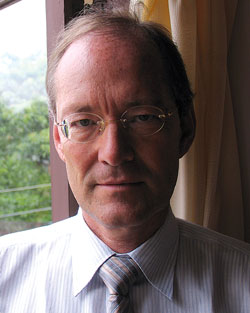 Nepali Times: Things seem stuck in the peace process.
Nepali Times: Things seem stuck in the peace process.
G?nther B?chler: The process is on track. Put it in perspective: the unilateral ceasefire of the CPN (Maoist), the seven-party alliance, the 12-point understanding, the April Jana Andolan, the 25-point code of conduct, the letters to the UN, the fact that there is a Special Representative of Kofi Annan here at the invitation of both sides. All this is progress, now it needs implementation. The interim constitution, although it couldn't be finalised, proved that political issues must be settled in the political arena. If both sides refrain from expanding their positions, and instead concentrate on their common interest-to elect a constituent assembly-then the open questions can be settled soon.
But there seems to be a wide trust gap.
There are suspicions, but 50 percent of the noise is posturing, bargaining, and campaigning, common for political parties. Only 50 percent is disagreement on real issues. Without continuous dialogue or a clear roadmap, growing mistrust will lead to a divergence of views and perceptions, and hardening of positions. After 27 August 2003, armed violence resumed despite political agreement on a six-point agenda. To avoid a repeat, building confidence and strengthening both talks teams is essential.
What influence does the international community have?
The peace process has been and is Nepali-driven, which is good. The international community expresses its views, but has limited influence on the process as a whole, which is also good. There are two concerns in the international community's statements. The continuation of violence, which drives statements about disarming the rebels before they join the political mainstream. Second, concern about the peace process as a whole, which promotes statements about a clear roadmap based on a more systematic approach to the talks that minimises suspicion and mistrust.
Yours is the second position, but isn't it different for those with geopolitical interest in Nepal and those without?
I don't think there are too many geopolitical interests at stake. The most important actor is India, and the complex, historically-grown relationship can be an asset for both sides. Of course there are different international views about how a democratic and peaceful Nepal would look. Some fear a left-wing alliance government more than others. Nepal is a sovereign country and we should help create a situation where voters can decide in a free and fair manner, without external political interference.
What is the Swiss interest?
For 50 years we've been engaged at the local level with the people of Nepal, with the excluded and marginalised. So we often see the peace process from the perspective of our partners in rural areas. If any political elite puts the process at risk, that jeopardises the positive transformation of the country. We all need to be committed to the peace process, spend time to make it sustainable, not just complain about failure of any side, or engage in business, politics, and development work as usual.
But is there still the political will for peace?
Yes, but there is also pressure to engage in parallel strategies that nourish suspicion and self-fulfilling prophecies of failure. Instead, we should ask: what is the source of the lack of confidence and erosion of trust, and how can it be re-built?
Constituent assembly elections are the major step to legitimise a representative body and draft a new constitution with full participation of all Nepalis. The focus should be on free and fair elections, but all sides are overloading the formation of an interim government with conditions. The interim government is becoming a barrier to a new constitution when it is in fact a temporary arrangement not yet been legitimised by the electorate. Political parties denying people their right to vote will lose credibility and pave the way for those who'd like to run the country with an iron hand.
What does your job entail?
I contribute ideas and help create an enabling environment for dialogue, support negotiations, and peace initiatives. I should not interfere in the process owned by Nepalis. I am confident, as I have established good relationships with all sides. My expertise in conflict resolution and negotiation, peace and constitution-making processes, and federalist state structures, is on offer. For example, I am now coaching a group of 20 Nepali women to strengthen their negotiation skills.
Do you think Nepal is unique?
Nepal has a remarkable conflict-carrying capacity compared to other countries, where armed violence has triggered complete state failure. There was never a full-fledged war and no extreme violence. Some ethical barriers, the focus on political options, and a strong, organised civil society helped prevent the worst. The media and human rights defenders also contributed. Finally, the society at large has enormous self-help capacity. The ability to handle the most difficult challenges provides a sound basis for building a peaceful democracy in Nepal.


